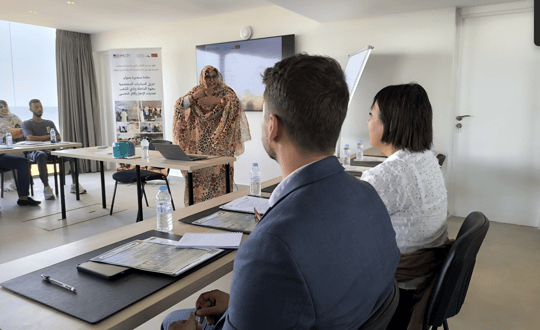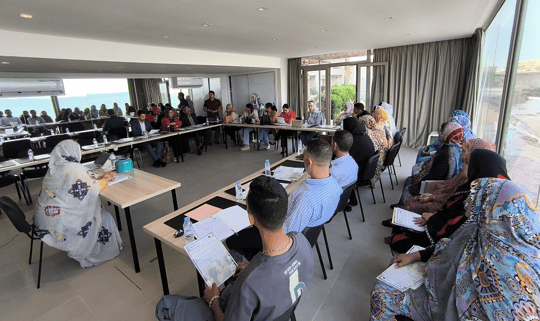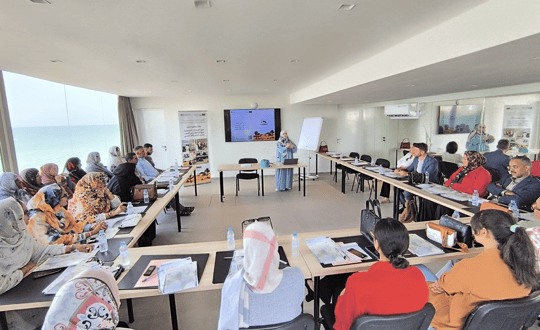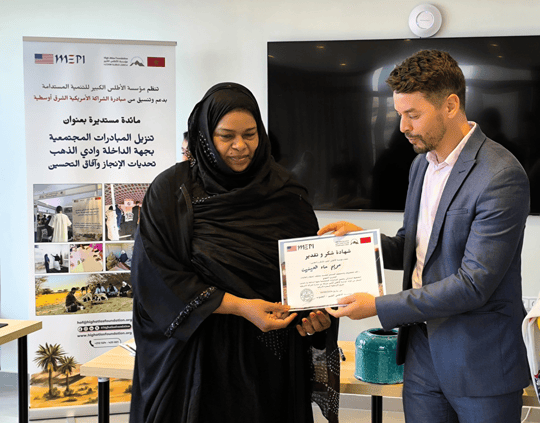Implementing Community Initiatives in Dakhla Oued Dahab: Insights from the Closing Event

"The world begins here," where patience transforms into strength, and pain evolves into achievements. It is not just a tent; it is a complete universe where women create a bright future, serving as teachers and guides, imparting knowledge, and instilling values while shaping generations.
The threads of life intertwine within the desert tent. This tent is not merely a shelter; it symbolizes empowerment, reflecting the strength of women and their ability to face challenges. In every thread woven, there lies a story of perseverance and determination.
I’m Amat Allah, 61 years old. I was born and raised in Dakhla, where I studied, got married, and raised my children and grandchildren. I live between Deshra, my house, and El Badiya, a tent in the heart of the Sahara.
Throughout my life, I have witnessed both peace and war, love and challenges. I find inspiration in the Talh tree (acacia).
This tree symbolizes resilience; it thrives in harsh climatic conditions, enduring strong winds and a lack of water. Its growth amidst desertification mirrors the strength of Sahraoui women.
Just as this tree patiently withstands adversity, we too embody strength and endurance. The Talh tree bears witness to the nomadic life, preserving our stories and struggles over centuries.
Our community is known for its cooperation, support, and a deep commitment to helping one another. We cannot abandon a cousin in need; even in scarcity, we share what we have.
We were born in the Sahara and will be buried in it, dedicated to preserving our mixed culture and ensuring future generations inherit it. This culture includes our traditional lifestyle, which is sadly at risk of becoming merely a memory, confined to books rather than lived experiences.
I fear a time will come when our way of life is lost to oblivion. We strive to educate our children about these values and their identity, instilling in them a sense of responsibility for their heritage.
We seek partnerships with diverse individuals to raise awareness about nomadic life and to address the challenges we face in the desert, such as water scarcity and harsh climatic conditions.
To this end, we have established cooperatives for sewing traditional tents, grazing, and preparing couscous, believing these initiatives can enhance our socio-economic and environmental situations. However, our efforts have not succeeded as we had hoped.
On December 1, 2022, we met Hana and Hajiba in Bir Gandus commune. This meeting transformed our vision and strategy.
I believe that the collaboration between the CSOs and the populations of both Bir Gandus and Bir Anezarane communes has changed since then, as we began to write a new story through our involvement in the program.
On September 26, 2024, I stood as the leader of the Gara Fok Gara Alliance, advocating for the pressing issues faced by our nomadic communities, particularly the critical water shortages that challenge our way of life. Representing 25 dedicated members, I participated in a round table event hosted by the High Atlas Foundation (HAF) in partnership with the Middle East Partnership Initiative (MEPI).
This gathering marks the culmination of a two-year program titled "The Participatory Planning and Implementation of Community Initiatives in the Dakhla Oued Ed Dahab Region."
Amat Allah was one of the committed women in Bir Gandus commune who was involved in the program from the beginning and when invited, she didn’t hesitate to participate in the closed event of the program.
The event, titled ´The Five Community Initiatives Implemented by the CSOs Participating in the Program: Challenges of Implementation and Future Sustainability´, brought together a diverse group of 24 individuals, comprising six government officers representing the Ministry of Education and National Mutual Aid, one elected woman, and 21 civil society organisation representatives from Bir Gandus, Bir Anezarane, and the Dakhla municipality.
The event provided a forum to present and discuss the five community initiatives developed during the program, including the Gara Fok Gara Alliance´s, with individuals sharing experiences of implementation and strategies for future sustainability, and fostering further collaboration among participants.

The Director of the Multifunctional Space for Women in Dakhla and the representative of the National Mutual Aid discuss the future opportunities in the region, 26 September 2024, Dakhla Municipality.
The five community initiatives have significantly enhanced trust between the CSOs and local decision-makers, focusing on various and critical areas such as healthcare, education, and women's empowerment. The five initiatives are:
- Initiative 1: Citizenship Tent for Capacity Building in Bir Gandus municipality, in partnership with Qodwa association.
- Initiative 2: Youth Academy for Enhancing Citizenship and Participatory Governance, in partnership with Mawashi Rimal Cooperative - Dakhla Municipality.
- Initiative 3: Gara Fok Gara Alliance Advocating for Nomadic Issues, including water shortages in the desert - Bir Anezarane commune.
- Initiative 4: Tidarget Tsamoh Alliance for the Empowerment of Rural Women, with Tidarguit Tasamoh for producing Couscous - Bir Gandus commune.
- Initiative 5: Sanad Caravans for Joint Healthcare Initiative in the Region of Dakhla-Oued Ed-Dahab, in partnership with the Sanad Association Dakhla municipality.
Abdellah Laaboudi, HAF´s Program Manager, gave a presentation demonstrating how the program has facilitated constructive dialogue between CSOs and local decision-makers. His impartial approach and ability to address various questions highlighted the program's positive impact on reducing rivalry among local groups. The creation of two alliances, directly linked to the program, has notably minimized conflicts, paving the way for more effective collaboration in addressing community needs. These two alliances comprise 10 cooperatives with 50 members, 84% of whom are young women.
Following Mr. Laaboudi´s presentation, representatives from each initiative, including Amat Allah, shared their personal stories and strategies for designing and implementing their initiatives in the region, enriching the discussion with local perspectives. This exchange showcased the commitment of community members and emphasized the program's role in empowering diverse groups, including youth and marginalized populations.
Participants brainstormed the future and sustainability of the initiatives, expressing a strong desire for continued support in economic empowerment and capacity building, to create more economic opportunities for young people. Recommendations included increasing the involvement of decision-makers and organizing online seminars to continue engagement.

Hajiba Boumasmar shared the outcome of the Youth Academy Initiatives and the advocacy action taken by the CSOs, 26 September 2024, Dakhla Municipality.
The event highlighted both the challenges of implementation and the path forward for sustaining these community initiatives in the Dakhla Oued Ed Dahab region. It underscored the importance of promoting civic engagement principles in the southern region and collaborating with local decision-makers to provide essential support for CSOs as representative of the populations and their voices.

Qodwa Association’s President receives the certificate of participation, 26 September 2024, Dakhla Municipality.
As the event concluded, the participating CSOs received their certifications as a form of encouragement and motivation to continue their vital work in the Dakhla Oued Ed Dahab Region and inspire other CSOs. As stated by Amat Allah, “I also received the certification, recognizing the alliance's efforts and contributions to the nomadic communities. This acknowledgment serves as a motivating force, inspiring me to continue advocating for our culture and fostering it.”